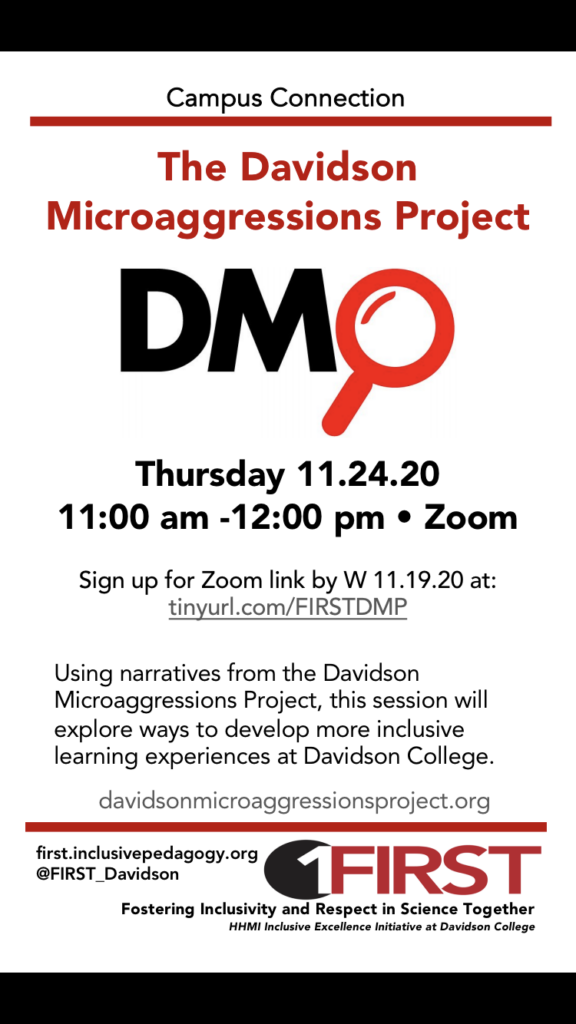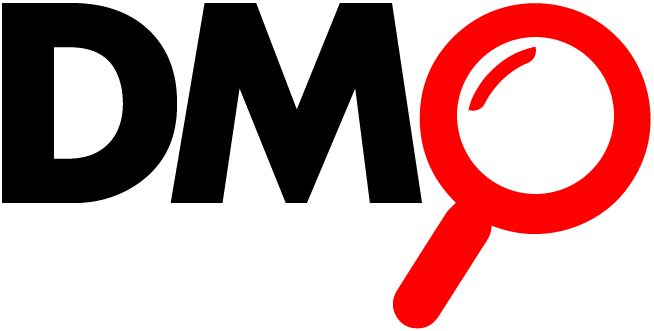
Using narratives from the Davidson Microaggressions Project, this session explores ways to develop more inclusive learning experiences at Davidson College. For specific action strategies to implement as you refine your approaches to addressing microaggressions, see our scanned handout from Derald Wing Sue & Lisa Beth Spanierman’s (2020) second edition book, Microaggressions in Everyday Life (Wiley). The DMP workshop co-facilitators provided the handout for attendees to draw upon in Zoom breakout group discussions to inspire their creativity and sensitivity in developing ideas to address and respond to the microaggressions that emanate from the stories below.
The FIRST/HHMI grant team at Davidson selected the following stories from the DMP website to focus on in the workshop we hosted with nearly 70 Davidson STEM faculty members:
Hard of Hearing
As a Hard of Hearing student I am frequently told things along the lines of, “You do not sound Deaf,” “Wow, I wouldn’t know you are hard of hearing if you had not told me. You must work so hard,” and “That is so inspiring that you have overcome so [much] get to where you are.” I am also often asked to “try to read my lips,” and “can you take out your hearing aids and then tell me if you can hear me?” While these microaggressions are annoying and invalidating, others have a truly detrimental impact on my ability to learn and participate, such as the refusal of people at events to wait for the microphone to speak because they will “just speak loud enough.” One semester I was in 80 person collaborative seminar. After class on the first day I went up to the professors and told them that I could not hear well in the room and it was difficult for me to find sight lines to read lips. I gave an explicit suggestion for a different room. One of the professors told me that the other room would not be better. I was uncomfortable telling him that I knew I would be able to hear better in the other room. Two months later, after several different attempts to make the room we were in work in different ways and getting the accessibility office involved we finally switched to the room I had recommended on day one. At the end of the first class in that room, a student raised their hand and asked if we could always meet in the new room because it was easier to hear. I felt both validated and deflated- If I had been listened to on day one not only would I have had a better learning experience, but so would all of my hearing classmates.
Name Mistaken
In one of my classes, I was mistaken for the only other black woman in my class. This was done by a student when trying to reference a point I had brought up in the previous class discussion two days before. This point he was trying to reference was said in a twenty minute presentation I had given last class. This other black woman and I have two vastly different skin tones and were sporting two very different hairstyles. When I corrected him on who he was trying to quote, he waved it off and perhaps spared me two seconds of eye contact. I was annoyed the entirety of the class period and looking back, I wish I had stood up for myself a bit more. Your dismissal of knowing my name is simultaneously you participating in the erasure of black women in academia.
Science Lab
During a science class, we had a class about BMI and health and part of the lab included weight yourself and measuring the circumference of different parts of our bodies. As a fat woman who has always been stigmatized for her weight, this “didactic” activity was very triggering and brought up a lot of fatphobia i had experienced in the past
“You Looked It Up!”
I just committed a microaggression while guest lecturing in a class a week ago. I was covering for another instructor and using their slides, and I didn’t know what they meant by a particular term. A student asked and I gave them my interpretation but said I wasn’t sure if that was exactly what the professor meant. A female student raised her hand and said something like “it means this” and gave a definition. We were in a computer classroom, so I assumed she had googled the term and I said something like, “great, thanks! You looked it up.” Her face flashed a weird look and I realized I had just insinuated that she couldn’t have known that without looking it up, and perhaps because she was a woman. This occurred to me after I had moved on to the next topic, and I didn’t know how to go back and apologize or correct my potential misperception without being really awkward in class. I don’t know the student’s name, so now I just have a horrible feeling in the pit of my stomach that I contributed to her feeling unwelcome in science classes at Davidson.
Traditional training programs aimed at cultural competence have shown evidence of affecting only explicit bias, while implicit bias remains relatively unchanged. Microaggressions research shows effectiveness hinges on change directed at cognitive, emotional, and behavioral development.
The last 12 years have resulted in 20,000 publications (scholarly and popular) of interdisciplinary work documenting the importance and cumulative effects of microaggressions. We all have the personal, moral, & ethical responsibility to do the self-reflection and self-education on this topic.
For additional accessible media resources to communicate the definition, manifestation, and impact of microaggressions, see the following list from Sue & Spanierman (2020, pg. 215):
Documentaries:
- Charlottesville: Race and Terror (Vice News, 2017)
- Color of Fear (Wah, 1994)
- Last Chance for Eden (Wah, 2003)
- Voices of Pain, Voices of Hope (Rabow, 2005)
TED Talks:
- No Way but Through (Domenech Rodriguez, 2014)
- The Urgency of Intersectionality (Crenshaw, 2016)
Short Videos:
- Companion videos to Dr. Sue’s textbooks
- Getting Called Out: How to Apologize (Ramsey, 2013)
- How Microaggressions are like Mosquito Bites (Fusion Comedy, 2016)
- If Microaggressions Happened to White People (MTV Decoded, 2015)
- If Asians Said the Stuff White People Say (As/Is, 2014, June 6)
- If Black People Said the Stuff White People Say (As/Is, 2014, June 20)
- If Latinos Said the Stuff White People Say (As/Is, 2014, July 12)
- Kinda Racist? Try Diet Racism! (College Humor, 2014)
- #LikeAGirl (Always, 2014)
- Morgan Murphy Highlights Subtle Racism (Doyle, 2009)
- Microaggressions in the Classroom (Flores Niemann & Carter, 2017)
- Racial Microaggressions: Comments that Sting (New York Times, 2014)
- Shit White Girls Say to Latinas (TheChristinal, 2012)
- Things Not to Say to a Trans Person (BBC Three, 2015)
- What Kind of Asian Are You? (Ken Tanaka, 2013)
- What Kind of Asian Are You? (Alex Dang, 2014)
- What Haters Say about Transgender People (My Genderation, 2016)
